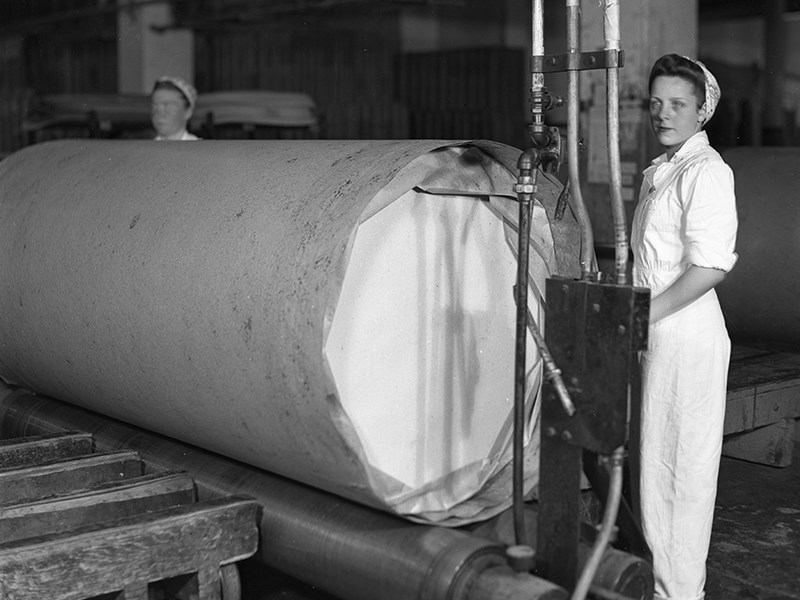Previous chapter [“The celebrity,” October 4]: In the summer of 1939, teenaged Nancy Crowther and her pack of dogs treed a goat-hungry cougar. With her rickety single shot .22 rifle she shot the cougar out of the tree but didn’t kill it. With her unloaded gun she engaged in a brutal attempt to finish off the cougar. When her gun broke into pieces, she eventually killed the seven-foot long animal with a rock. The harrowing encounter made the Powell River News, turning “Cougar” Nancy into a local celebrity until she was swept off the pages by impending events in Europe.
Nancy and her family survived The Great Depression by selling clams from their beaches, fighting off cougars and relying on their goats, chickens and ever-growing garden and orchard for sustenance. Then the news of the Second World War swept down upon them, reaching the remote Penrose Bay in Okeover Inlet.
Like across the rest of Canada, young men from the Powell River and Lund areas rushed to sign up to fight the Nazis, which left many regular day jobs unfilled. Powell River was then home to one of North America’s major pulp and paper mills, and the first and largest newsprint mill in the west, eventually becoming the largest pulp and paper mill in the world.
The machines had to grind on, and when the men left, young women from the area were called upon to keep the mill running. Nancy Crowther was one of those women.
For the first time since moving to her tiny homestead in the rainforest in 1927, Nancy Crowther left her family cabin and moved to “town,” returning only on the weekends.
To get from the homestead to the mill in Powell River and back again, she walked the 30 kilometres along a bumpy, unforgiving trail past gigantic stumps. It was a gruelling six hour hike to her new job at the mill, where she was put to work millcapping and sheet laying.
And though Nancy Crowther often felt like a caged animal in the cavernous mill, longing for her wilderness home, she proved so proficient at millwork, and was so physically strong, it has been said that other mill workers actually asked her to slow down for fear of making them look bad.
Nancy Crowther was paid 55 cents an hour at the mill, which was considered good money in the 1940s. She could make almost $5 in a day and over $20 a week, a far cry from the abject poverty she and her family experienced during the 1930s. Nancy even joined the Pulp Sulphite Union.
Besides the money, Nancy Crowther soon discovered there were other perks to town life, so far removed from the hardships of the wilderness. Just up the hill from the mill was the Patricia Theatre, a Powell River jewel, still operating to this day as the longest running movie theatre in Canada.
Before the film, Nancy Crowther and her girlfriends from the mill would excitedly pop into the sweet shop next door for exotic treats like Turkish delight and banana splits, before paying their nickel each to find seats in the ornate movie theatre.
When the lights went down, you can imagine how thrilled Nancy must have been to bear witness to The Adventures of Robin Hood, starring Errol Flynn and Olivia de Havilland, in blazing Technicolor. It was the first movie Nancy Crowther ever saw.
Back home in the woods on the weekends, her father’s eyesight continued to worsen, so Nancy and her mother did what they could. For her part, Nancy continued to bag cougars that threatened the livestock, which meant she continued to receive headlines in the Powell River News throughout the 1940s, such as Girl Cat Killer In The News Again and Lund Girl Bags Four Cougars In The Same Day and Crowther Kills Her Ninth Cougar At Okeover Arm.
Because she was now making money, she was able to upgrade from her measly .22 calibre rifle to a much more powerful and accurate .30-30 rifle. Nancy Crowther trained her dogs to become so proficient at treeing cougars that they became known as “cougar catchers” or “cougar dogs,” and the Crowthers began to breed them for neighbours.
When the men came home from the war, Nancy left the mill and took up a job at the Hudson’s Bay Company store just up the hill in Townsite. Life kept humming along, until one day, near the end of the 1940s, Nancy was returning home for the weekend. She was hiking the final few kilometres through the woods along the shore of Okeover Inlet to her family homestead when she smelled it.
Looking up through the trees, she saw it: a thick column of billowing black smoke. Rushing up to the crest of a hill on the trail, she looked down into her family’s isthmus homestead and gasped with horror. Her family cabin was engulfed in flames.
That’s in the next chapter of the Cougar Lady Chronicles.
Grant Lawrence is an award-winning author and a CBC personality who considers Powell River and Desolation Sound his second home. Portions of the Cougar Lady Chronicles originally appeared in Lawrence ’s book Adventures in Solitude and on CBC Radio. Anyone with stories or photos they would like to share of Nancy Crowther are welcome to email [email protected].



